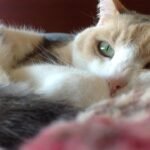Have you ever walked through your front door only to find your cat sitting there, staring as if they’ve been waiting for hours? That intense, expectant gaze makes it seem like they somehow knew exactly when you’d return. This mysterious ability has puzzled cat owners for generations and sparked countless theories about feline intuition.
While it might feel supernatural, the truth behind your cat’s door-watching behavior is actually rooted in science and their remarkable sensory abilities. From their extraordinary hearing to their keen understanding of routine, cats possess an impressive toolkit that helps them anticipate your arrival with startling accuracy.
Their Incredible Hearing Gives Them the Upper Hand

Cats have great hearing, can detect a broad range of frequencies, and hear higher-pitched sounds than humans and, actually, most dogs. When you park in your garage or take the elevator, they know, because they hear you. Like their canine counterparts, cats can hear the sounds of us coming home: Our car in the driveway, or us walking up the stairs.
Over time, they learn that these sounds predict our arrival. Think about it: your cat recognizes the unique sound of your car engine, the particular way your footsteps echo in the hallway, or even the jingle of your keys from a distance that would be impossible for human ears to detect.
They’re Masters of Routine Recognition

Cats have a good sense of time, which means cats can figure out when in the day you are coming home. Routine is something that makes sense to them, it is easy to follow along, and enables cats to know the time of your arrival, especially if you have a consistent schedule, which they can learn and get used to.
If you come home every day around 7 p.m., your pet gets familiar with it and expects you to arrive by this time. Cats can learn our schedules, especially when there is food in it for them. Their internal biological clocks are incredibly precise, allowing them to predict your return with remarkable accuracy.
Love and Attachment Drive Their Behavior

Often, a cat will sit and wait at a door because they are waiting for someone. Cats and their owners can form very special bonds. Even in a busy household, a cat may bond with one of the family members over the others, and their devotion to their chosen human is touching. If their favorite human is not at home, the kitty may sit at the front door calmly and patiently waiting for their return.
Cats have a rep for being aloof, but spend enough quality time with one, and you’ll realize they form deep bonds. Cats are creatures of routine – and you are their routine. They notice when you leave (and come back), and they rely on your presence for comfort. One study even found that cats can distinguish their owner’s voice from a stranger’s (though they might pretend not to care)!
Their Heightened Senses Create a Sixth Sense Illusion

Like dogs, cats have very powerful senses that allow them to pick up on things humans can’t. Specifically, a cat’s sense of smell and hearing is much more finely tuned than ours, and their night vision and ultra-sensitive sense of touch keep them much more alert throughout the day.
Their seemingly extraordinary abilities stem from their remarkably heightened five senses: sight, smell, hearing, taste, and touch. These senses are far more powerful and refined than our own, giving cats an edge in perception and awareness, making their capabilities appear almost supernatural. What seems like mystical intuition is actually their incredible sensory processing at work.
They’re Naturally Territorial Guardians

Cats are probably the most curious of all our pets – always near the activity, watching and often interfering. Cats are skilled predators and have lost none of their natural hunting instincts through domestication. They are always alert and ready to launch into hunt mode at a moment’s notice. This state of readiness makes them more inclined to need to know exactly where everyone and everything is, and what’s going on in their vicinity.
Cats are naturally territorial creatures, and closed doors represent both a boundary and a mystery in their domain. When your cat sits outside your bedroom door, they’re often engaging in instinctive surveillance behavior. Door-watching allows them to monitor their territory and keep tabs on the most important members of their household.
Food Motivation Plays a Bigger Role Than You Think

Besides getting super-excited to spend some time with you, cats can have something else on their minds, like, food. They have been a good boy or girl all day long and can’t wait to be treated with some delicious thing that only you can give them, therefore, they wait for you, so you don’t forget about them.
Anticipating your return triggers a “reward response” in their brain. Think of it as feline Pavlovian conditioning: Door opens = treats + pets + playtime. Your arrival has become associated with all the good things in their daily routine, making door-watching a form of positive anticipation.
It’s Simply Part of Their Communication Style

Cats who are close with their owners are more likely to know their routines, habits and body language. This ability to understand how you are feeling and know when things deviate from the norm might appear like amazing intuition or a sixth sense.
Next time your cat greets you at the door, remember: They’re not just being “cute.” They’re expressing love, loyalty, and a whole lot of feline logic. Door-watching represents their unique way of staying connected with you and maintaining the social bond that’s so important to their emotional well-being.
Your cat’s seemingly psychic ability to know when you’re coming home isn’t magic – it’s the result of millions of years of evolution creating the perfect companion animal. Their exceptional senses, combined with their deep attachment to you and their natural curiosity, make them incredibly effective at predicting your return. The next time you find your cat waiting by the door, take a moment to appreciate the complex mix of biology, psychology, and pure affection that brought them there. What do you think about your cat’s door-watching behavior? Have you noticed any specific patterns with your own feline friend?






